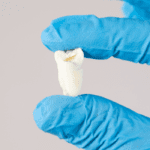Although a dental crown may effectively cover and protect a broken tooth, it will not protect you from experiencing dental pain.
A tooth crown can have the same problems as a regular tooth. The crown may cause discomfort, sensitivity, and pressure. You could also experience a constant toothache.
There are many reasons why your crown might hurt. Find out what might be causing your pain and what you can do to reduce it.
What Are Crowns for Teeth?
A dental cap covers a broken tooth. It is cemented and covers the damaged tooth that’s visible to you. Ceramic, porcelain, and metal are some materials used to make crowns.
The crown is responsible for restoring a tooth’s size and shape while protecting it. There are times when a crown for tooth is used to hold a dental bridge.
A crown may be necessary to protect a tooth after a root canal procedure. Your dentist may also recommend a crown for you if you have:
- weakened or cracked tooth;
- large cavity;
- missing tooth that requires a dental implant or bridge; or
- misshapen or discolored tooth
How Long Do Crowns Last?
Crowns can last anywhere from five to fifteen years on average. The length of a crown’s life span will vary depending on its exposure to wear and tear, personal hygiene practices, and other factors.
These habits may include:
- Using your teeth as a tool
- Biting your nails
- Teeth clenching or grinding
- Chewing ice
Do Crowns Require Special Aftercare?
Crowned teeth don’t require special care. However, the underlying teeth still need to be protected from gum disease and decay. This is why you need to continue following good dental hygiene practices.
Tooth Pain After Crown: What Might Be Causing It?
General discomfort after placing a crown is normal. However, pain that persists for more than a week after the procedure might be because of other factors, such as:
1. Infection
The tooth’s nerves may still be present if no root canal was performed before the crown was placed. Sometimes, the crown places pressure on the nerve, resulting in an infection.
Also, old crown fillings under the dental crown tend to leak bacteria that can cause nerve infections. Some of the signs include:
- Fever
- Temperature sensitivity
- Pain when you bite
- Swelling of the gums
2. Tooth Decay
The throbbing tooth pain after crown might be because of tooth decay under the crown. A root canal procedure may be necessary if the tooth cavity is large enough to affect the nerve.
3. Fractured Crown or Tooth
Mild pain can result from a cracked crown or tooth under a crown. Because of the crack, you might feel sensitivity to cold or heat. If your crown appears broken, loose, or cracked, it should be fixed.
4. Sore Gums
After the procedure, you might experience this dental crown problem. The pain should not last more than two weeks. If you experience severe pain after a crown procedure or pain that persists for more than two weeks, consult a dentist.
5. Teeth Grinding
If you grind your teeth in bed, it could cause pain. This is especially true if your crown is not aligned and high-tooth areas are rubbing together.
You may experience:
- Occasional swelling in the lower part of your jaw or face
- Long-lasting pain
- Jaw pain upon waking up
If you share a bed with your partner, you might disrupt their sleep because of the bothersome teeth grinding sound.
6. Recessed Gums
Harsh brushing can cause gum recession. If the gums surrounding your crown tooth recede and expose part of the root, you might feel pain or sensitivity. Receding gums become more susceptible to plaque buildup and gum diseases.
7. Loose Dental Crown
It can cause discomfort if your crown isn’t fitted correctly. A bad fit can also cause problems with your smile and bite. When you feel pain when you bite down, it is usually because the crown is too high on your tooth.
A crown should be able to fit your bite precisely like your other teeth. It could cause jaw pain or headaches if your bite feels “off.”
How to Treat the Painful Dental Crown Problem
Crown pain treatment depends on the severity and cause. Here’s how to stop tooth nerve pain:
1. Pain Medications
Temporary relief can be provided by OTC (over-the-counter) medication like acetaminophen or Advil if you suffer from a toothache.
2. Herbal Remedies
Although there is no scientific evidence to support its effectiveness, some users report tooth nerve pain relief after ingesting herbal remedies. You can apply some of these herbs directly to the tooth.
Here are some herbs you can use to relieve dental crown pain:
- Chamomile
- Turmeric
- Garlic
- Ginger
- Clove
3. Saltwater Rinse
Saltwater rinses can reduce inflammation and pain. Use 1/2 teaspoon of salt to warm water and gargle the solution for around 30 seconds. Repeat this process several times daily.
4. Cold Compress
Applying a cold compress on the affected side of your face can help. It can reduce swelling and inflammation by constricting the blood vessels.
5. Avoid Problematic Foods
After getting a crown for tooth, avoid sticky, sweet, or hard foods to reduce pain. Triggers can also include hot and cold food. It is best to eat foods at room temperature.
6. Address Teeth Grinding
Your doctor may recommend treatment for bruxism if your problem is rooted in grinding or clenching. There are two options for tooth nerve pain relief: mouth guards and mouth splints.
7. Clove Oil
Clove oil is a traditional medicine that’s used to anesthetize patients. It is a critical ingredient in the evolution of dentistry. Eugenol is a chemical compound that is highly antibacterial, anesthetic, and used to treat toothache in all eras of history.
You should use clove oil with caution. It can cause gum and tooth damage if used excessively.
When Should You See Your Dentist?
If you have severe tooth pain or persistent discomfort, you should consult a dentist. The dentist may recommend a root canal, a tooth extraction, or a crown replacement.
You can avoid dental crown pain by practicing good dental hygiene. Do the following:
- Schedule regular checkups with your dentist
- Don’t skip flossing
- Brush your teeth twice a day
Advanced Dental Group Is Here for You
Although you might feel some discomfort after getting a crown put in, it should subside within a few weeks.
You may have tooth crown pain due to infection, decay, fractures, or another issue. See a dentist to determine the cause of your toothache. Advanced Dental Group has a network of dentists in Clearwater, FL. Call us to address any dental issues right away!





